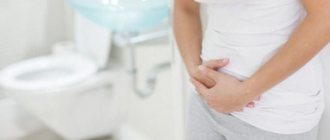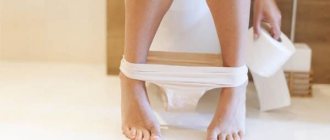Despite the abundance of laxatives in pharmacies, when treating constipation, many people prefer to use folk remedies, such as a bar of soap and a soap enema.
Is it safe to insert soap for constipation, and how to do it correctly so as not to aggravate the problem? Let’s take a closer look.
Operating principle
The effect of soap against constipation is explained quite simply - it irritates the rectum, due to which it begins to work, and stagnant feces come out.
Previously, this method was considered absolutely harmless, but today doctors talk about it as a dubious treatment for constipation:
- On the one hand, soap is actually safer than laxatives, which have side effects and are addictive. Even if the soap suppository remains in the anus, after a while it will dissolve on its own and come out with the stool.
- But there is also a downside - the soap contains alkali, which can cause ulcers and burns on the intestinal mucosa.
Accordingly, a soap enema or soap for constipation should be used very carefully, taking into account all contraindications.
Will laundry soap really help with constipation?
Soap began to be used in the fight against constipation back in the Soviet years, when there were few laxatives in pharmacies. At that time, the “soap” method was considered safe and universal, but modern doctors constantly dispute this statement. To prevent soap from harming the body, it is worth understanding exactly how it acts when it gets into the anus.
In case of constipation, a bar of soap can effectively soften stool, which will ensure rapid bowel movement. Soap is used as the main ingredient for the preparation of enemas to cleanse the intestines and laxative rectal suppositories.
The effect of a soap bar on the body is similar to the result of the action of well-known suspensions that are used rectally. Due to the direct contact of soap with the mucous membrane, only natural varieties are used to facilitate the process of defecation.
Laundry soap for constipation in an adult will give the fastest effect. And baby products act gently, slowly stimulating the intestinal system. Tar soap is completely prohibited for use. It acts too actively on intestinal receptors and can provoke serious inflammation in the intestines.
You should not make candles from moisturizing soap cream. Despite the fact that this product provides skin hydration, it takes away moisture from the mucous membrane, which can cause cracks in the anus. In addition, such a mass contains a large list of additives that cause fat imbalance.
Can it be used for constipation?
Experts recommend using soap instead of an enema only in isolated emergency cases, when a person is sure that the problem is not related to any serious disease.
This method is not recommended for use in the following cases:
- For regular constipation.
- If problems with the intestines are accompanied by nausea, fever, severe abdominal pain, blood and pus in the stool.
- In the presence of ulcers or inflammatory processes in the intestines (irritable bowel syndrome, colitis, etc.).
In all of the above cases, soap as a laxative will not only not alleviate the condition, but can also cause serious complications.
Soap for constipation during pregnancy is not the best remedy, but given that pregnant women have contraindications to the use of most laxatives, sometimes it can be used to alleviate the condition (with all precautions) no more than a few times in 9 months.
Contraindications
It is possible to use soap or a soap solution to cleanse the intestines if you are sure about the causes of constipation. Only the absence of a serious illness with a symptom in the form of absence of bowel movements allows the procedure to be used.
There is no answer to the question about using soap for dysbiosis or ulcers. The drug has a laxative effect, cleanses the intestines, but has side effects and aggravates these diagnosed diseases.
Contraindications for the use of soap or soap solution for constipation:
- Lack of bowel movement is chronic. This type of constipation is caused by serious disorders of the internal digestive organs. Soap will not solve the main problem, but will make the situation worse.
- There was no bowel movement for 3 days. As a result of long-term presence of food residues in the canal, putrefactive processes occur. The toxins released are absorbed into the bloodstream and distributed throughout the body's systems. Intoxication occurs.
- Stool occurs accompanied by nausea and vomiting. Body temperature rises, pain appears. Provoking factors are intestinal infections. The fight against them should be carried out with medications and under the supervision of a doctor.
- Diagnosed with irritable bowel syndrome. Discomfort is caused by excessive motor activity in one of the sections of the digestive tract.
- Abdominal bloating is observed. Excessive gas formation often accompanies constipation. The bolus of food stagnates, the microorganisms that process it produce gases during their vital activity, which increases the content of air bubbles in the channel.
- Peptic ulcer of the stomach, duodenum.
- Hemorrhoids, the presence of fissures in the anus. In this case, it is not recommended to use laundry soap.
- Pregnancy is also a contraindication to the use of soap therapy. This can lead to complications.
What soap should I use?
If you have problems with bowel movements due to constipation, it is recommended to use 2 types of soap - laundry and baby soap. They are natural products that do not contain foreign impurities that can cause intestinal problems.
Do not use tar soap or ordinary cosmetics as a laxative, even if the manufacturer claims that it has a moisturizing effect. Contrary to such statements, it dehydrates the mucous membrane, which can lead to the formation of cracks.
Regular toilet soap can cause a condition called tenesmus - a false urge to empty the bowel, which is caused by irritation of the nerve plexuses.
Candles made from laundry soap act faster, but they can only be used in adults - in newborns, laundry soap as a laxative can cause intestinal problems due to the large amount of alkali.
Let's turn to soap for help
One of the effective home remedies for bowel congestion is constipation soap. It is actively used in children and adults even today, when pharmacies have many different modern laxatives. There is still controversy surrounding the treatment of constipation with soap.
For the procedure, preference should be given to baby soap.
In household products, the concentration of alkali is too high, so it is easy to get irritation and burn the mucous membrane. You need to cut a small piece of soap from a whole bar and form a thin candle using a knife and water. Then you need to insert it into the rectum; for convenience, you should lie on your side. If a piece breaks off, don't worry - it will come out during a bowel movement.
Operating principle
The effect of a soap candle is simple - it irritates the walls of the rectum and helps to “wake up” the intestines. Its walls actively contract, allowing feces to move through. Previously, this method of relieving constipation was considered safe, but over time, experts came to the conclusion that it could only be used once.
Soap suppositories are safer than many medicated laxatives, since most of them have side effects, including addiction. Even if some of the soap remains in the anus, after a while it will come out along with the feces.
On the other hand, soap contains alkali, which can cause burns to the mucous membrane and the formation of ulcers.
Therefore, you should use an enema and a soap suppository carefully. All preparation features, contraindications and possible complications should be taken into account.
Therapy rules
A soap suppository is effective for mild constipation in adults. If you are worried about heaviness and pain in the abdomen, there is nausea, high fever and increased gas formation, this condition may indicate the development of certain diseases, including intestinal obstruction, for which the use of home remedies is unacceptable. Soap is used for minor problems with stool, when an intestinal irritant is required to stimulate the passage of feces.
What soap to use
For constipation in an adult, use baby soap. It is completely natural and does not contain impurities that can cause intestinal problems.
You should avoid using cosmetic and tar soaps. These cosmetic products dehydrate the mucous membrane, provoke the formation of cracks and false urges to defecate. In infants, candles made from laundry soap can cause complications due to the high concentration of alkali; this type is not suitable even for adults.
Soap for newborns
Many on the forums like to advise using soap for constipation in a newborn, which causes a lot of controversy. But since most medications for constipation are contraindicated for babies, some mothers still use soap as a less dangerous remedy.
This method should be used only if other methods of relieving constipation have not given the desired result. In this case, you can give preference to baby soap and use it as a last resort.
It is necessary to insert soap candles into a newborn according to the rules.
- For the procedure, use baby or hypoallergenic soap no thicker than a match.
- Smooth out the corners using water and your fingers.
- Place the child on his side and insert the prepared suppository into the intestine.
- The soap should be injected shallowly, but there is no need to leave it in the anus. To facilitate defecation, it is necessary to lubricate the mucous membrane with oil or Vaseline.
Soap should be used rarely in infants and only when necessary. Regular treatment with such home remedies disrupts the natural bowel movement process.
Soap for newborns
Soap for constipation in a newborn is a subject of constant discussion among parents and pediatricians. Constipation in infants is a common problem faced by most parents.
In this case, many mothers prefer to use soap: laxatives are harmful to the child’s body, and most drugs are not recommended for use in children.
But precisely because of the sensitivity of infants to various kinds of irritants and chemicals, soap for constipation should be used in a child under one year of age very carefully and in extreme cases when other methods (massage of the tummy, flexion-extension of the legs) do not give the desired result.
Instructions on how to insert soap into a newborn:
- To properly supply soap to a child, you need to buy a hypoallergenic children's product (you cannot use laundry soap) and cut a piece of soap the thickness of a match.
- Smooth out the sharp edges, then place the baby on his side and carefully insert the candle into the anus several times.
- You cannot insert soap deeply into the anus or leave it there - a few strokes along the anus will be enough for normal bowel movements.
- You should not use this method regularly for constipation in children, otherwise the intestines will get used to the procedure and its functioning will be disrupted.
It is better to discuss the problem of frequent problems with bowel movements in infants with a pediatrician, who will select the necessary treatment method, and also consider the mother’s diet or replace the milk formula.
Are there any risks?
It is not without reason that medicine takes the side of medicinal methods of combating frequent constipation in infants, in adult patients, during pregnancy and lactation. Doctors explain this by saying that the soap contains alkaline substances that corrode and irritate the sensitive walls of the intestines.
Much safer and healthier are natural oil candles, which are sold in pharmacies. In addition, constant use of soap candles can lead to addiction. The intestines will no longer cope with their task on their own.
Is it possible to do a soap enema?
A soap enema is a safer method than soap suppositories for constipation, since the alkali in this case dissolves in water and does not come into contact with the intestinal walls.
The rules for using different types of product are the same as for the “soap in the rectum” method: adults will use an enema with laundry soap or children’s soap, for children – only the second option.
A soap enema is performed as follows: dissolve a small piece of soap in water and perform the procedure in the usual way.
As a conclusion, it must be said that soap for constipation can quickly and effectively relieve the condition in cases where constipation is a temporary isolated phenomenon in a healthy person.
If you experience regular constipation, you should consult a doctor to find out and eliminate the cause of poor bowel function.
Contraindications and warnings, possible risks
Before using soap for constipation in a child, it is important to familiarize yourself with the following contraindications:
- Irritable bowel syndrome.
- Presence of elevated temperature.
- Constipation for more than three days.
- Chronic form of the disease.
- Anal fissures.
- If an allergic reaction was observed when using soap candles.
- Intestinal diseases.
If there are contraindications and the baby does not have bowel movements, you need to consult a doctor for examination and proper treatment. Otherwise, there is a risk of worsening the condition.
Also, when constipation and using folk remedies with soap, it is important to know about the possible risks of:
- Intestinal disorders.
- Irritations.
- False urge to defecate.
- Formation of ulcers.
- Allergic reaction.
- Anal fissures.
- Burns to the mucous membrane.
- With regular administration, there is no spontaneous emptying.
Despite the first glance at the safety of using soap and its effectiveness, treatment of constipation in children should only be carried out under the supervision of a doctor. Self-medication does not always lead to a positive result, and what’s even worse is that it worsens the baby’s condition and increases constipation. Therefore, homemade preparations for fecal congestion should be used once, in the form of an adjuvant.
How to make a rectal suppository?
At home, you can prepare a rectal suppository by following these simple recommendations:
- We take safe laundry or baby soap. Grate 50 g on a fine grater
- To the resulting soap shavings you need to add 10 g of olive oil or Vaseline.
- The resulting mixture must be dissolved in 100 ml of water.
- Then cook in a water bath for an hour, stirring constantly.
- The resulting mixture must be poured into special forms that resemble rectal suppositories and placed in the refrigerator until completely hardened.
- Before use, it is recommended to hold the candle in your hand to warm it to body temperature. The positive effect occurs within a few minutes after inserting the suppository into the anus.











